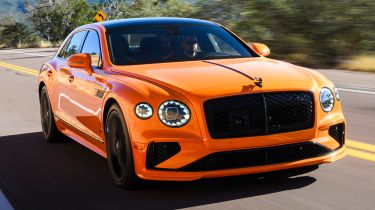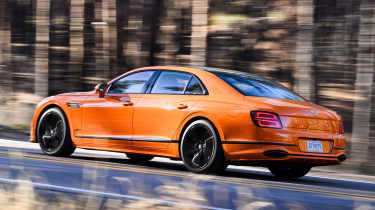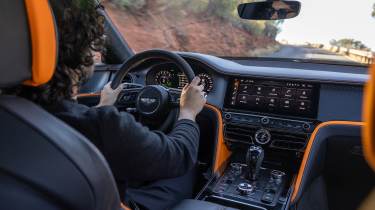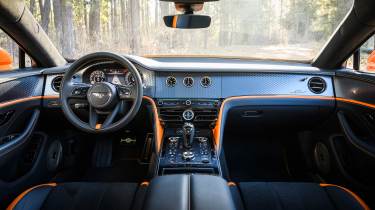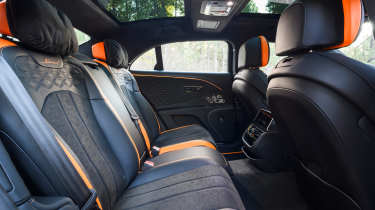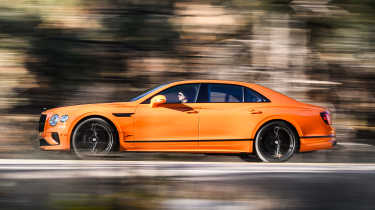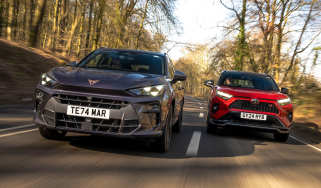Bentley Flying Spur review
A superb new powertrain and an even wider range of chassis ability, between sumptuous comfort and dynamic handling, make the new Bentley Flying Spur a wonderful luxury saloon

Is the Bentley Flying Spur a good car?
Thanks to the introduction of a plug-in hybrid V8 powertrain and even more sophisticated suspension tech, the new Bentley Flying Spur has been put onto an even higher plane. More engaging than a Rolls-Royce, more opulent than a Mercedes-AMG S 63 E Performance, the new Flying Spur is an utterly spectacular example of luxury motoring that comes with the added bonus of much-improvement efficiency figures, as well as even higher levels of performance.
| Key specs | |
| Fuel type | Plug-in hybrid petrol |
| Body style | Luxury saloon |
| Powertrain | 4.0-litre V8, twin-turbocharged, eight-speed dual-clutch auto, plus 1x e-motor, 25.9kWh battery pack, all-wheel drive |
| Safety | 5* |
| Warranty | 3yrs/unlimited miles |
How much does the Bentley Flying Spur Speed cost?
The big, luxurious and very orange saloon you’re looking at might appear similar to the Flying Spur that’s been on sale since 2019, but trust us when we say things have definitely changed under the skin.
Initially launched with a pure V8 or W12 engine, the Flying Spur has always been more opulent than German rivals such as the Mercedes S-Class and BMW 7 Series, while offering a more engaging driving experience than a Rolls-Royce Ghost. Yet while the previous iteration could easily be considered the best version yet, it still had one or two gaps in its repertoire that stopped it short of being a total triumph.
This is something Bentley wants to address with this new and heavily revised Speed, which features the stonking 771bhp plug-in hybrid powertrain from the new Continental GT. It also has a set of suspension and tech upgrades that are designed to give it an even wider breadth of abilities, between being a comfortable cruiser at one end of a spectrum and a high-performance car at the other.
Used - available now

2023 Ford
Kuga
47,524 milesAutomaticPetrol2.5L
Cash £19,300
2020 Land Rover
Range Rover Velar
63,000 milesAutomaticDiesel3.0L
Cash £25,995
2020 BMW
X3
48,000 milesAutomaticDiesel2.0L
Cash £23,995
2020 BMW
X3
40,700 milesAutomaticDiesel3.0L
Cash £33,995All this doesn’t come cheap, with a starting price of £226,500, but then there are few, if any, rivals that get close to offering the Flying Spur’s combination of raw speed, luxury and charm.
Engines, performance & drive
| Model | Power | 0-62mph | Top speed |
| Bentley Flying Spur Speed | 771bhp | 3.5 seconds | Over 200mph |
The transformative powertrain has a similar set-up to the one in the Porsche Panamera Turbo E-Hybrid – which is not a bad technical partner – but the way Bentley has tuned it genuinely transforms the whole experience with very little in the way of compromise.
The V8 engine itself produces 592bhp, which is then augmented by a 187bhp e-motor packaged into the eight-speed dual-clutch transmission. Together they produce a peak torque of 1,000Nm, all of which helps hauling the car’s 2,646kg feel more effortless than with not just the previous V8, but also the W12. It’ll crack the 0-62mph benchmark sprint in 3.5 seconds and carry on to over 200mph. What the numbers don’t tell you is how the powertrain feels, because when it comes to the new Flying Spur, it truly is a case of having your Victoria sponge cake and eating it, too.
Because the V8 has so much help from the e-motor, Bentley has been able to dispense with some of the fuel-saving requirements necessary if it were the sole power source. As a result the turbos are now single-scroll, rather than more sophisticated twin-scroll units, reducing complexity and allowing Bentley’s engineers to optimise the running of those turbos for pure performance. Nor is there any cylinder deactivation, and even the exhaust sounds slightly more liberated from fuel-saving measures.
To offset this, Bentley can run the Flying Spur in low-speed or light-load driving scenarios on the e-motor alone, allowing the V8 to be more specially tuned to high-speed running. Yet the ultimate balance of petrol engine and electric motor is largely down to the selected drive mode, with the variation between effortless and efficient hybrid with superb refinement through to its most aggressive Sport mode being the transformative factor.
On start-up, the Flying Spur will always take off in silence on the electric motor, and if left to its own devices Bentley claims the car can travel up to 47 miles on the WLTP cycle. While this figure is a little optimistic in the real world, it’s still far more than you’ll find in rivals like the Mercedes-AMG S 63 AMG and will even match BMW’s more efficiency-optimised M760e. This e-mode start-up is inherent in both the default ‘Bentley’ and ‘Comfort’ modes, with the option of locking the car into a hybrid mode via a button by the gear selector also available.
With Sport mode selected, however, the Flying Spur’s character takes on a much more emotional personality. It’s now that the V8 engine will be fully exploited and then augmented by the e-motor for maximum performance. With so much weight on board, the Flying Spur never feels particularly agile, but then it is always beautifully controlled and predictable, thanks to a combination of chassis tech (including rear-wheel steering, active anti-roll bars and an electronically controlled limited-slip differential) with adept tuning to keep it all working seamlessly together.
However, where the new Speed really pulls ahead of the old car is its ride, because Bentley has employed a new and more sophisticated dual-valve damper combined with twin-chamber air suspension that offers a much more fluid ride quality. The company says that the extra bandwidth in the car’s dynamic ability is focused at the comfort end of the spectrum, and compared there is a tangible improvement over the previous variant.
It’s not quite perfect, though, because the large 22-inch wheels do still sometimes send thumps through the cabin on rough roads, and road and wind noise is more noticeable than in the whisper-quiet Rolls-Royce Ghost. But putting these small gripes aside, the Flying Spur’s general handling and ride comfort are superbly judged and effortlessly cope with the extra 200kg or so gained by the new plug-in powertrain and its 25.9kWh battery.
MPG, CO2 & running costs
| Model | MPG | C02 | Insurance group |
| Bentley Flying Spur Speed | 202mpg | 33g/km | 50 |
As with all plug-in hybrids, on-paper figures often need to be taken with a grain of salt, and in this case, Bentley’s 202mpg combined rating isn’t quite reflective of driving with the petrol engine engaged. Instead, the figures will always vary depending on how the car is driven and in which mode. We found that on test, while it would be difficult to match the WLTP range of 47 miles on highways, 30 miles is more realistic in day-to-day driving.
We also drove a relatively fast 90-mile route with the car locked into hybrid mode, which showed a figure of 42.6mpg, while only eating through around 20 per cent of the available battery – extremely good figures for a car of this size and weight. By comparison, the much less powerful V8 S of the previous generation would struggle to top 20mpg on a similar trip.
If you have access to low-cost charging, and run the car in the more efficient modes, there’s no reason this figure won’t skyrocket, because the EV range is higher than the average distance driven daily by many. Even on longer journeys, the electric motor’s ability to drive the car without the V8 engine’s input makes urban and motorway driving effortless – and has the added bonus of being totally silent.
Fuel aside, though, running costs will be high. Expensive 22-inch Pirelli P Zero tyres are the original fitment, and consumables like brake pads and discs are also a consideration. The optional carbon-ceramic brakes should last the life of the car, but they still are susceptible to wear.
Design, interior & technology
Unlike the more substantially restyled Continental GT coupe and convertible, the new Flying Spur’s design updates are subtle, at most, with a new front bumper insert, grille mesh and material options being the crux of the changes. All Speed models come as standard with a new matte Granite finish to the brightwork around the windows and front grilles, with a gloss black option still available for a more subtle look.
A systematic highlight of all Bentleys is their superbly constructed interiors, and the new Flying Spur is no different. It too shares most of its elements with the pre-facelift third-generation model, with changes limited to some new materials with less glossy finishes and an even wider palette of colour and material options. Fundamentally, though, this is still a key part of the Bentley experience.
The first thing that hits you from the driver’s seat is the driving position: it’s relatively low in the cabin, a sensation that’s only accentuated by the shallow windscreen and side windows. There is a good level of adjustment, and while the car can initially be a little intimidating to drive, the accurate steering and good turning circle make it easy to handle, even on tighter roads.
Build quality is exceptional, and aside from an occasional use of relatively low-rent plastics in areas such as inside the air vents, everything else you touch is superbly crafted from fine leathers, real metal or very convincing imitations. The seats are also a particular highlight, thanks to their very good massage function and fine balance of support and comfort. We also can’t forget the stunning quality of the hand-finished wood, turned aluminium or carbon-fibre fascias.
Sat-nav, stereo and infotainment
The new Flying Spur’s digital interfaces might look the same as before, but while the amount of screen real-estate hasn’t grown, the quality and variability of them have – and to great effect.
The main 12.3-inch touchscreen still handles most tasks, and while the embedded system does need a little bit of getting used to, it’s generally easy to navigate. It’s also worth mentioning that it still sits on a movable panel with either blank wood or a set of three analogue dials on its other two sides. This isn’t a new feature, but even now this continues to be a real highlight of the overall interior experience.
As well as the screen, there’s still lots of physical controls – adjusting everything from the air-conditioning to the seating functions, sun-blinds and driver modes – that are all quickly accessible on the centre console.
Ahead of the driver is a further digital display, which is new and features much higher resolution than the previous generation, plus more useful customisation. Behind this sits a head-up display, but while it is clear and has lots of functions, it doesn't quite have the latest augmented-reality capabilities of the units in rival cars.
Plus, while the Naim audio system has quite a reputation in the car world for its clarity and depth, this system is now being out-performed by other high-end set-ups found in cars like Polestars, Volvos and BMWs.
Boot space, comfort & practicality
| Dimensions | |
| Length | 5,316mm |
| Width | 1,988mm |
| Height | 1,474mm |
| Number of seats | Five |
| Boot space | 346 litres |
One area where the Bentley doesn’t really shine is its packaging and interior space. Despite the car’s vast footprint, there’s not as much space in the second row for passengers as you’ll find in all its key rivals. Legroom and shoulder room are ok, but the low roofline and sleek exterior styling mean this isn’t as spacious a place to sit as in its key rivals.
Overall comfort, as stated above, also isn’t quite as downright luxurious as in most rivals, but it’s never uncomfortable. The boot is also a little compromised by the same packaging constraints, plus the need to find a home for the 25.9kWh battery pack.
Safety & reliability
| Key standard safety features | Euro NCAP safety ratings |
|
|
Previous-generation Flying Spur models have always achieved a full five-star safety rating, and there’s no reason to assume the new model will be any different. In terms of reliability, a modern Bentley is a complicated creature, so there is a lot to go wrong. However, these are generally used as daily drivers and few, if any reliability issues have been noted.
Because the new model has a totally new plug-in hybrid powertrain, this might change. But Bentley’s extensive development period, not to mention Porsche also working on the system, does mean it has benefitted from some of the most exhaustive development processes in the business.
Bentley Flying Spur Speed alternatives
Where once it was easy to compare Bentley to its more upright Rolls-Royce sibling, the brands have diverged so far that we largely don’t consider them as rivals at all. The Rolls-Royce Ghost II has been recently revealed, and while it too is a large luxury four-door saloon, it is still intended primarily as a car to be driven in, rather than to drive.
Looking at more mainstream competitors from Mercedes-AMG and BMW, both now offer high-end hybrid performance models in the S63 and M760e, but neither match the Flying Spur on opulence or drama. You might even go so far as to call the Mercedes much more dynamically focused, especially considering its hybrid module is very much set up for high-performance driving and now e-motor cruising.
The BMW M760e is closer in spirit to the Bentley, but is actually a bigger car, and despite having a similar 47-mile EV range, is quite a lot less powerful and considerably less expensive – to the tune of nearly £100,000.
A left-field opponent could be considered to be the BMW M5, a model that is also much more sporty, but in reality is a similarly powerful saloon with much the same interior space and technology. However, its close connection to the much less opulent 5 Series will likely put off many buyers at this end of the market, putting the Flying Spur in a class of one in our eyes – which is quite an achievement.
Frequently Asked Questions
Bentley provides a three-year unlimited-mileage warranty.

